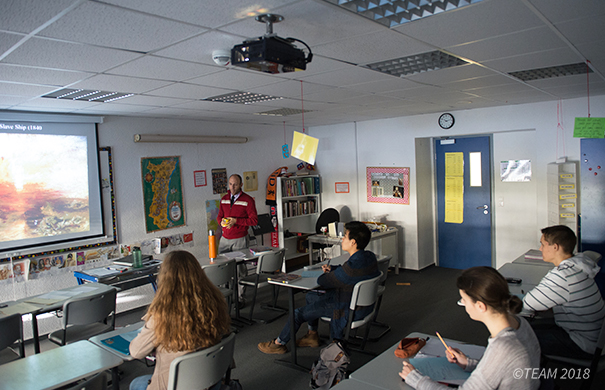
Missionary Life
Where Do I Send My Missionary Kid to School? [FREE Download]
August 28, 2018
by admin

Deciding how to educate your kids can be overwhelming for any parent. But put that parent on the mission field, and you have a whole new level of stress.
It’s not just finding a school that’s strong in academics. It’s creating a missionary kid education plan that will:
· Help your kids learn the local language
· Teach them about their host culture
· Teach them about their own culture
· Give them friends
· Prepare them to one day return to their passport country
· Hopefully not scar them for life
So how do you do it?
I sat down with TEAM’s global third culture kid (TCK) coordinator, Valerie Williams, to find out. For nearly a decade, Valerie has helped parents navigate foreign education systems and build solid plans for their kids. And as a former missionary, she knows those difficulties firsthand. Today, I’m sharing her process for creating a missionary kid education plan.
Read to the end for a BONUS download for your education planning!
1. Decide what education means to you — without your spouse.
When it comes to education, it’s easy to assume you and your spouse have the same values. But Valerie says writing down your philosophies separately helps some of the unseen differences come out.
“Sometimes the parents have grown up in very different contexts and don’t realize that they have different opinions on what education is,” Valerie says.
So, Valerie recommends that each parent write a paragraph on what you believe education is for. Then, come together and share your perspectives. Are there surprises? Are there conflicts? Now is your chance to work through them together, before any investment has been made.
Once you’ve worked through any differences, write a new educational philosophy as a couple. Keep it as a reminder throughout your missionary kids’ educations. It will guide you in making the best decisions and help you honor each other as you do so.
2. Figure out your 18-year goals.
Missionary life is busy, and navigating education in a foreign country can be tricky. So, it’s not always a surprise when missionary kids turn 18 and aren’t quite ready for life as young adults. Or rather, it is a surprise — for all the wrong people.
Valerie urges parents not to be blindsided. Instead, ask yourself, “By the time my child turns 18, what do I want them to know and believe?”
If you want your kid to attend college in their passport country, you’ll want a missionary kid education plan that meets that country’s requirements. If you want them to develop a certain talent, you might pick a school with that extracurricular. If you want them to have a Christian education, you may send them to a Christian school.
Keep your vision broad, but be intentional in meeting that vision.
3. Ask someone on the field what’s possible — and what looks bad.
Before you get your heart set on an educational ideal, ask a missionary or expatriate about what’s possible. Not every field has a missionary kid school at the ready. Not every country allows homeschooling. Find out what’s actually available. And then, find out what’s culturally acceptable.
If the best fit for your family is culturally uncommon, you may decide to stick with it anyway. But you should be prepared for the impression you’ll make. For example, homeschoolers have to be able to answer the question, “Why aren’t our schools good enough for you?”
Find out how local people perceive various school options, and plan how you’ll handle or avoid those perceptions.
4. Figure out who your kids are.

Not every school option will be a good fit for your children. Take your kids’ personalities and interests into account as you make decisions.
“It’s definitely not one size fits all,” Valerie says. “Each of your children are unique … and you need to think about what suits their needs best.”
Talk with your kids about what they like and where they thrive. When Valerie returned from the mission field, she and her husband asked their kids what they wanted to do. One chose public school; the other two chose homeschooling.
Even if your kids are younger, Valerie says to look at their personalities. Is your kid self-motivated enough for homeschooling? Can your child handle being away from family at boarding school? Will a local school give them the academic stimulation they crave?
5. Have a plan B … and C, D and E.
Even when you’ve done all your research, things change. Hold your plans loosely.
Valerie swore she would never send her kids to a boarding school. But when her oldest child outgrew the local missionary kid school, she says, “he pretty much wilted that year.” He did school online, but he didn’t have any friends.
So, on the family’s next trip to the States, Valerie let her son stay behind with a family friend and attend school there. And once again, her son began to thrive.
That season taught Valerie to never say never — and to be open to God’s surprises.
Your ideal school might close. Or you might discover that it doesn’t work for your child. But if you have a backup plan, these changes won’t make you panic. You’ll move to the next option — and keep moving until you find what’s right.
6. Decide how you’ll fill in the gaps.
If you send your kid to a local or international school, you may have to fill in gaps so they meet their passport country’s expectations.
Valerie strongly warns against doing this in the first year: “Your child is going to be absolutely exhausted from being in a different language environment all day — just as you will be after a few hours of language school.”
But once your child has a firm foundation in their host culture, start teaching your country’s history at home. Have them practice writing by keeping a journal or writing a letter to Grandma. With some simple exercises, you can help your kid build a firm foundation in both cultures.
7. Write it down.
Once you have your plan figured out, don’t just hold it in your mind. Writing it down will help you think through every aspect of the plan. Sharing it with your missions agency or supporting church will help them support and encourage you with the best resources. And having a plan on paper makes it easier to re-assess.
At the end of the school year, pull out your plan and see how you did. What worked? What didn’t? What do you want to add or take away next year? Answer these questions and add them to the written plan.
You may not always have the perfect school situation, but with a bit of work, you can see your kids thrive in cultures around the world!
————
Want to learn more about creating a missionary kid education plan? We asked missionaries for their best tips, their biggest challenges and how they make each kind of school work on the mission field.
Download your missionary kid education guide to get the scoop on boarding schools, homeschooling, online schools, national schools and international schools!


